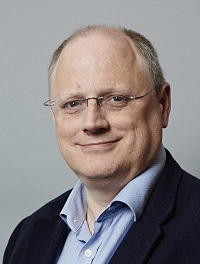 Britta Bonn, Albireo Pharma Inc., Sweden
Britta Bonn, Albireo Pharma Inc., Sweden
Britta has a MSc in Pharmaceutical bioscience from The University of Gothenburg and a PhD in drug metabolism (Experimental and computational investigation of affinity and selectivity factors in CYP2D6 and CYP3A4 mediated metabolism) from The University of Gothenburg Division of Medicinal Chemistry. She has worked for AstraZeneca for 19 years first as a biotransformation expert and further on as DMPK scientific lead in both preclinical and clinical stage projects as well as preclinical project lead leading cross-functional teams in lead identification and optimization phases. Within these roles she has gained extensive knowledge in drug discovery processes, strategies to optimize drug project delivery and a broad knowledge within other scientific disciplines. During her last years at AstraZeneca she transitioned to early clinical development and since April 2021 she holds the position as Director of DMPK at Albireo Pharma supporting both early stage and clinical assets.
From her 20 years in pharma industry, she has a strong scientific background within metabolism and pharmacokinetics with extensive experience within drug discovery and has also co-authored book chapters about Metabolism and pharmacokinetic optimization in drug discovery and Design of inhaled medicines
 Janet Brownlees, MSD, United Kingdom
Janet Brownlees, MSD, United Kingdom
Dr Janet Brownlees is a Senior Director of Neuroscience Biology at the Merck Sharp and Dohme (MSD) Discovery Research Centre in London, U.K. leading a team of biologists working on various mechanisms of ageing and neurodegeneration.
Janet has many years of neuroscience research experience in both academia and 18 years of drug discovery experience. She completed a BSc in Biochemistry at Queen’s University, Ireland followed by a PhD on peptidase activity of the endothelia cells of the blood brain barrier. Janet then moved to post-doctoral positions at King’s College where she worked on neurofilament and mitochondria dynamics, axonal transport and tau phosphorylation. Throughout her academic career, she has published many papers and reviews. Janet made the transition to industry with a move to GlaxoSmithKline, Harlow U.K., working in various groups in the Neuroscience Therapeutic Unit, and then taking on Project Leadership and a Team Leader role. Moving to a non-profit drug discovery organisation, LifeArc (previously MRCT Technology), Janet worked on neurodegeneration, pain and oncology largely through academic, charity and biotech collaborations to advance early-stage projects towards viable commercial entities, with many of these being licenced to Pharma for further development. She led the Dementia Consortium with Alzheimer’s Research U.K. and was leading the Neuroscience research both internally and externally at LifeArc.
 Jerermy Burrows, Medicines for Malaria Venture, Switzerland
Jerermy Burrows, Medicines for Malaria Venture, Switzerland
Dr. Jeremy Burrows is VP, Head of Drug Discovery at Medicines for Malaria Venture (MMV). He heads up the Discovery team at MMV and works with Pharmaceutical companies, Universities and other institutions to delivery new candidate drugs for antimalarial therapy, anti-relapse, prophylaxis and transmission blocking.
Jeremy obtained a MA in chemistry and a D.Phil. in synthetic organic chemistry at Oxford University (1989-1996). In 1997 he joined ZENECA/ AstraZeneca as a medicinal chemist working in Infection, Cardiovascular and Inflammation research at Alderley Park in the UK. In 2005 he was seconded to Södertälje, Sweden in CNS/Pain where he led a section focused on Alzheimer’s disease. In 2008, he joined MMV and in 2010 became Head of the Discovery team, overseeing a growing portfolio of enabling technology, screening, Hit-to-lead and Lead Optimisation projects.
He has been involved with the delivery of numerous candidate drugs for multiple disease areas, over 25 of which have been for malaria and has published over 150 papers, book chapters and patent applications.
He sits on the advisory and review committees for several external drug discovery collaborations within the neglected disease area including the Wellcome funded DNDi-GSK Chagas collaboration. He is a Fellow of the Royal Society of Chemistry and an Honorary Research Fellow at the Liverpool School of Tropical Medicine. He is a co-organiser of the Wellcome Practical Aspects of Drug Discovery Course.
 Ian Collins, The Institute of Cancer Research, United Kingdom
Ian Collins, The Institute of Cancer Research, United Kingdom
Ian Collins carried out his PhD research on the synthesis of alkaloid natural products at Cambridge University with Professor Andrew B. Holmes, and began his post-doctoral career as a medicinal chemist at The Neuroscience Research Centre of Merck Sharp & Dohme Ltd, researching new drugs to treat psychiatric and neurodegenerative diseases. Major contributions included the discovery of the first selective antagonists for the dopamine D4 receptor, the development of sub-type selective GABA-A agonists as anxiolytics, and the discovery of potent gamma-secretase inhibitors. In 2003, he moved to lead a medicinal chemistry team in the Cancer Research UK Cancer Therapeutics Unit at The Institute of Cancer Research, London, becoming Professor of Medicinal Chemistry in 2013 and Head of Chemistry in 2018. His research team focusses on the discovery of molecular targeted cancer drugs, with an ongoing interest in the application of structure-based design methods. The group’s research has led to a number of molecules in clinical trials including HSP90, AKT and CHK1 inhibitors, as well as the discovery of selective chemical tool compounds to probe cancer cell biology. Current interests include the manipulation of protein degradation in cancer cells by small molecule modulators of E3 ligases. He is a founder of the protein degradation spin out company Monte Rosa Therapeutics, Inc. He is co-recipient of the AACR Team Science Award (2012) and the CRUK Translational Research Prize (2013).
 Andrew Cook, AstraZeneca, United Kingdom
Andrew Cook, AstraZeneca, United Kingdom
I am currently Assistant General Counsel, Intellectual Property at AstraZeneca, where I have global overall accountability for the development and implementation of IP strategy for the Cardiovascular, Renal and Metabolism (CVRM) and Neuroscience therapy areas. In addition, I have global oversight of IP strategy development across all of AZ's Digital and AI activities. On reflection, my career path has been slightly unusual. Having studied law at Oxford, in the mid-1990s I qualified as a solicitor and worked for a number of years as an employment lawyer in London and Leeds. But I always had a passion for science, and so whilst still working as a lawyer, I completed a BSc in chemistry at the Open University and then left law to do a PhD in organic chemistry at Leeds. I then plunged myself fully into science, joining AZ as a medicinal chemist in 2005, later becoming both a drug discovery project and team leader. And it was whilst working in the labs at AZ that I realised you could combine law and science into a single career as a patent attorney, which led me to join AZ’s Intellectual Property team in 2010. 17 years and counting at AZ and I am still loving it!
 Cheryl Doherty, GSK, United Kingdom
Cheryl Doherty, GSK, United Kingdom
After carrying out a PhD at the University of Bath in Crystallography, Cheryl joined Pfizer Materials Sciences at the UK Sandwich site in 2006 as a small molecule crystallographer and moved to GSK in 2019 where she leads a small and structurally focussed team within the GSK Materials Science department at Stevenage. During her time at Pfizer and GSK her primary focus has been on developing API solid forms for drug candidates, involving combining experimental studies along with the application of advanced crystallographic methods and solid-state modelling to accelerate and enhance the solid form development process. This has also included introducing advanced crystallographic techniques to trouble-shoot complex behaviour in pharmaceutical products, such as by using synchrotron sources to analyse API and drug product single crystals, powders and dosage forms. Cheryl represents GSK on the Diamond Light Source Industrial Liaison Committee, is Bursary officer for the British Crystallographic Association and is a Fellow of the Royal Society of Chemistry.
 Colin Edge, Consultant, United Kingdom
Colin Edge, Consultant, United Kingdom
Colin Edge is a consultant chemist with 40 years’ experience of chemical calculations and 35 years’ experience in the use of computational chemistry to support pharmaceutical research, development and manufacture.
 David Fox, Vulpine Science and Learning, United Kingdom
David Fox, Vulpine Science and Learning, United Kingdom
Following a PhD and post doc in chemistry, David joined Pfizer, Sandwich in 1993 as a medicinal chemistry team leader. During his career at Pfizer, he headed-up chemistry sections working in a range of therapeutic areas including Anti-Virals and Cardiovascular. He has been directly involved in the identification of eleven development candidates from eight mechanistic classes, including four Phase 2 compounds and is co-author of over 40 publications and reviews and a named inventor on 16 patents.
Between 2011-2016, David took-up a part-time role with the RSC as Industry Associate. David has also set-up a consultancy company Vulpine Science and Learning and he is currently the Wellcome Trust-funded Expert in Residence at the University of Birmingham. In addition, he delivers drug discovery teaching modules at the University of Birmingham and Imperial College London as well as workshops on employability with Bristol University and Canterbury Christchurch University.
 Darren Green, GSK, United Kingdom
Darren Green, GSK, United Kingdom
Darren Green is Head of Cheminformatics & Data Science and Senior Fellow, GlaxoSmithKline. His group specialises in the application of data analysis, machine learning and chemoinformatics methods to drug discovery. Darren also leads the Compound Collection Enhancement strategy for GSK.
Darren has a PhD in Theoretical Chemistry from the University of Manchester and is a Fellow of the Royal Society of Chemistry.
 Andrew Hopkins, Exscientia, United Kingdom
Andrew Hopkins, Exscientia, United Kingdom
Andrew Hopkins, DPhil is the Founder and CEO of Exscientia. He is one of the most distinguished and cited scientists in modern drug discovery. After more than a decade at Pfizer, Andrew was drawn to academia to pursue pioneering research projects applying data mining and machine learning to the pharmaceutical industry. His invention of an automated and algorithmic approach to drug design and discovery led to the founding of Exscientia. Since its founding, the Exscientia team has grown to more than 300 employees with offices around the world and has delivered the world’s first three AI-designed drugs into the clinic.
Following Exscientia’s successful listing on Nasdaq in October 2021, Andrew’s focus as CEO is a patient-first mission to accelerate the creation of the best possible medicines with improved probability of success using AI methods to select targets, precision design new drugs and enhance patient selection.
Andrew holds a first class BSc in Chemistry from the University of Manchester and a DPhil in Molecular Biophysics from Wadham College, Oxford. He is also an honorary professor at the School of Life Sciences, University of Dundee, where he previously held Chairs in translational biology and medicinal informatics.
 Ruth Lock, Aucuba Sciences Ltd, United Kingdom
Ruth Lock, Aucuba Sciences Ltd, United Kingdom
Dr Ruth Lock has over 20 years of experience in DMPK and Clinical Pharmacology within the Pharmaceutical Industry, gained whilst working with UK-based companies Servier, Pfizer, AstraZeneca, Novartis, and Takeda. She has supported projects through all stages of Research & Development, including post-marketing commitments and established products. She has experience of both small molecule and biologic drugs and has experience across a wide range of therapeutic areas in which she can also provide specialist DMPK and Clinical Pharmacology expertise in inhaled drug development. In addition to her DMPK discovery background, Ruth has a broad knowledge of DMPK and Clinical Pharmacology development packages to support global regulatory submissions. Whilst working in Pharma, Ruth was passionate about the development of high quality, innovative therapies for children and was a member of a global paediatric network at one of her former companies. Ruth is familiar with in silico, in vitro and in vivo ADME assays and methodologies and has expertise in PBPK modelling.
Aucuba Sciences Ltd was founded by Ruth in 2016, specialising in DMPK and Clinical Pharmacology expertise and knowledge for both drug discovery and development programmes. Based in London, she assists in the resolution of drug discovery and development challenges and works with a range of clients throughout the UK, Europe and the USA.
Ruth is currently a tutor and lecturer for the Drug Metabolism Discussion Group (DMDG) Pharmacokinetics course. Past positions also include Honorary secretary, officer, and committee member for the Society for Medicines Research (SMR), a multi-disciplinary society for all those engaged in drug research.
 Andy Merritt, LifeArc, United Kingdom
Andy Merritt, LifeArc, United Kingdom
Dr Andy Merritt has held the post of Head of Chemistry at the LifeArc (formerly MRC Technology) Centre for Therapeutics Discovery (CTD) since the summer of 2009. In close collaboration with academic scientists, the CTD develops and subsequently prosecutes innovative drug discovery programmes emerging from academic research. During this time small molecule assets in oncology and neuroscience have been partnered with pharmaceutical companies for ongoing clinical development. In addition, tool compounds, supporting research in both these areas and in diseases of the developing world, have been optimised, published and shared across the global research community at no cost. LifeArc also supports academic research group access to compound screening collections covering a range of target classes and technologies.
Prior to his current position Andy was a Director of Discovery Medicinal Chemistry at GlaxoSmithKline, covering early lead discovery from screening campaigns, global responsibility for outsource support for lead discovery chemistry and the supply of tool compounds for target validation. Between 1995 and 2001 as part of the GlaxoWellcome organisation he led interdisciplinary teams focusing on lead discovery and optimisation incorporating the development of new chemical technologies. Andy joined the former Glaxo organization as a senior medicinal chemist in 1988 following postdoctoral studies in the US.
Andy sat on the RSC Chemistry World editorial board between 2003 and 2019 and has been a regular undergraduate lecturer in pharmaceutical medicine at Imperial College, Warwick and Sussex universities.
 Tony Mete, Medsyndesign Ltd, United Kingdom
Tony Mete, Medsyndesign Ltd, United Kingdom
After training as a synthetic organic chemist at Oxford (BA), City (PhD) and Sussex (Post-Doc) universities I worked as a medicinal chemist in R&D in a range of industries for over 25 years, in scientific & project leadership roles and as a team manager. The companies were Glaxo, Shell, AstraZeneca and Medimmune in the pharma, biotech and crop protection sectors. My work has led to over 60 publications, patents and conference presentations. The therapy areas I have worked in have covered antimicrobial, antiviral, inflammation & respiratory (COPD, Asthma, RA, OA), inhaled and oral drugs and small peptides for metabolic diseases. The biological targets have included both receptors and enzymes such as GPCR & chemokine antagonists and lipase & protease inhibitors. The medicinal chemistry campaigns that I have led (in both LI and LO) have resulted in some 10 candidate drugs being identified for clinical development (several in Phase II). Since 2012 I have worked as an independent drug discovery consultant through my own company (Medsyndesign Ltd) and I have consulted for a range of small companies and universities in several disease areas (CV, oncology and injectables).




























